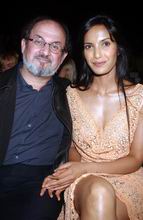Step Across This Line Collected Nonfiction 1992-2002
| |||||||||||||||||
|
Editeur - Casa editrice |
Vintage |
|
|||||||||||||||
|
Anno - Date de Parution |
2002 | ||||||||||||||||
|
Pagine - Pages | 416 | ||||||||||||||||
|
Titolo originale | Step Across This Line: Collected Nonfiction 1992-2002 | ||||||||||||||||
|
Lingua originale | |||||||||||||||||
|
Lingua - language - langue | eng | ||||||||||||||||
|
Ristampa - Réédition - Reprint |
2003 Modern Library | ||||||||||||||||
|
|
|||||||||||||||||

|
Amazon.com (United States) - order this book Step Across This Line: Collected Nonfiction 1992-2002 |
||||||||||||||||
|
|
|
Step Across This Line showcases the other side of one of fiction’s most astonishing conjurors. On display is Salman Rushdie’s incisive, thoughtful and generous mind, in prose that is as entertaining as it is topical. The world is here, captured in pieces on a dazzling array of subjects: from New York’s Amadou Diallo case to the Wizard of Oz, from U2 to fifty years of Indian writing, from a tribute to Angela Carter to the struggle to film Midnight’s Children. The title essay was originally delivered at Yale as the 2002 Tanner lecture on human values, and examines the changing meaning of frontiers in the modern world -- moral and metaphorical frontiers as well as physical ones.
Recensione in altra lingua (English): |
| For all their permeability, the borders snaking across the world have never been of greater importance. This is the dance of history in our age: slow, slow, quick, quick, slow, back and forth and from side to side, we step across these fixed and shifting lines. --from Part IV | |||||||||||||
| Recensione in lingua italiana | |||||||||||||||||
|
Roughly one-fourth of these essays deals with the response of the media, various governments and Rushdie himself to what he calls the "unfunny Valentine" he received on February 14, 1989, from the Ayatollah Khomeini: the fatwa calling for his death. Everyone, it seems, had a script for Rushdie to follow, though none of these fantasies resembled the rather simple one the author fancied (and which seems to have been realized), which is that his problems gradually disappear and he be allowed to resume a more or less normal writerly life. To paraphrase an idea that appears in several of these essays, the problem is that frontiers cross us rather than the other way around: we are going about our business when our country is divided (as happened to Rushdie's native India in 1947) or we encounter a shocking work of art or our enemies declare they will kill us. Many respond to unnerving changes by embracing religion, but, says Rushdie, "ancient wisdoms are modern nonsenses"; in place of sectarian fervor, he recommends intellectual freedom, a simple concept yet a rigorous practice, as this book proves. These essays range over literature, politics and religion, as well as Rushdie's two private passions, rock music and soccer. They are united by a play of sparkling intelligence seasoned with sly wit, qualities that would serve the world at any time in its long, flawed history. After all, says Rushdie, the story he loved first and still loves best, perhaps the story of all humanity, is The Wizard of Oz, a fable that tells us the grown-up world doesn't really work, that adults can be good people and still be bad wizards. | |||||||||||||||||
| Biografia | |||||||||||||||||
|
Salman Rushdie (nato il 19 giugno 1947, a Bombay, India) è un saggista e autore di opere di narrativa, in gran parte ambientate nel Subcontinente Indiano. Crebbe a Mumbai (allora Bombay) frequentò il King's College di Cambridge in Inghilterra. È un cittadino inglese. Il suo stile narrativo, che amalgama il mito e la fantasia con la vita reale, è stato descritto come collegato al realismo magico. Nel 2004, Rushdie si è sposato per la quarta volta, questa volta con una modella ed attrice indiana Padma Lakshmi. | |||||||||||||||||
| Consulta anche: Biografia Aggiornata in Wikipedia (english) | |||||||||||||||||
| Consulta anche: Biografia in Wikipedia (italiano) | |||||||||||||||||
| |||||||||||||||||




 Step Across This Line
Step Across This Line
